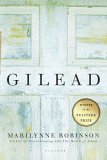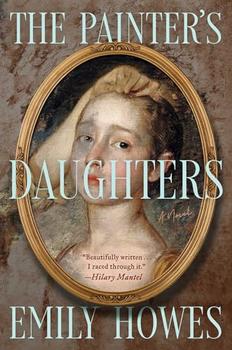Reading Guide Questions

Please be aware that this discussion guide will contain spoilers!
Since the publication of Marilynne Robinson's widely praised 1981 debut,
Housekeeping, readers have long anticipated a second novel from this
extraordinary
writer.
Gilead at last fulfills that hope, combining a profound exploration
of life's mysteries with magnificent storytelling.
Told through the eyes of a Midwestern minister nearing the end of
his life,
Gilead unfolds in the form of a letter. As Reverend Ames writes to
his young son, we learn of the family's legacy, a heritage steeped in abolition,
economic hardship, and conflicting views on religion and war as each generation
comes of age. The 1950s find John Ames comparing his grandfather, a
fiery Union Army chaplain, to his devoutly pacifist father while a gentle turn
of events poses the question of racial equality in new terms. Throughout the
novel, he recalls a life shaped by love—for his faith, his vocation and his
church, for prayer, for his town and all it has meant, for his father and
grandfather, for his books, for baseball, for his lifelong friend, for his
physical
life and the splendors of the physical world, for his memories, and for
the young wife and infant child to whom he remains loyal over solitary
decades.
Stirring an array of questions regarding peace and turmoil, faith and
disillusionment, memory and mortality, Gilead illuminates each facet of
these issues with sparkling precision. We hope this reader's guide will enrich
Gilead.
Discussion Questions
- What was your perception of the narrator in the opening paragraphs? In
what ways did your understanding of him change throughout the novel? Did
John's own perception of his life seem to evolve as well?
- Biblical references to Gilead (a region near the Jordan River) describe its
plants as having healing properties. The African American spiritual, "There
Is a Balm in Gilead" equates Jesus with this balm. According to some
sources, the Hebrew origin of the word simply means "rocky area." Do these
facts make Gilead an ironic or symbolically accurate title for the novel?
- The vision experienced by John's grandfather is a reminder that the Christ
he loves identifies utterly with the oppressed and afflicted, whom he must
therefore help to free. He is given his mission, like a biblical prophet. This
kind of vision was reported by many abolitionists, and they acted upon it as
he did. What guides John in discerning his own mission?
- How does John seem to feel about his brother's atheism in retrospect?
What accounts for Edward's departure from the church? What enabled John
to retain his faith?
- The rituals of communion and baptism provide many significant images
throughout the novel. What varied meanings do John and his parishioners
ascribe to them? What makes him courageous enough to see the sacred in
every aspect of life?
- One of the most complex questions for John to address is the notion of
salvation—how it is defined, and how (or whether) God determines who receives
it. How do the novel's characters convey assorted possibilities about
this topic? What answers would you have given to the questions John faces
regarding the fate of souls and the nature of pain in the world?
- Marilynne Robinson included several quotations from Scripture and
hymns; John expresses particular admiration for Isaac Watts, an
eighteenth century
English minister whose hymns were widely adopted by various
Protestant denominations. Do you believe that certain texts are divinely
inspired?
What is the role of metaphor in communicating about spiritual matters?
- Discuss the literary devices used in this novel, such as its epistolary
format,
John's finely honed voice, and the absence of conventional chapter
breaks (save for a long pause before Jack's marriage is revealed). How would
you characterize Gilead's narrative structure?
- What commentary does John offer about the differences between his two
wives? Do you agree with Jack when he calls John's marriage unconventional?
- John describes numerous denominations in his community, including
Lutherans, Presbyterians, Methodists, Quakers, and Congregationalists.
What can you infer from the presence of such variety? Or does the prevalence
of Protestants mean that there is little religious variety in Gilead?
- What might John think of current religious controversies in America? In
what ways are his worries and joys relevant to twenty-first-century life?
- John grapples mightily with his distrust of Jack. Do you believe John
writes honestly about the nature of that distrust? What issues contribute to
these struggles with his namesake?
- Discuss the author's choice of setting for Gilead. Is there a difference
between
the way religion manifests itself in small towns versus urban locales?
What did you discover about the history of Iowa's rural communities and
about the strain of radicalism in Midwestern history? Did it surprise you?
- Abolition drew John's grandfather to the Midwest, and the novel concludes
at the dawn of the civil rights movement. In what ways does this evolution
of race relations mirror the changes John has witnessed in society as a
whole?
- Is Gilead a microcosm for American society in general?
- In his closing lines, John offers a sort of benediction to his son, praying
that he will "grow up a brave man in a brave country" and "find a way to be
useful." Do you predict a future in which his hope came true? What do you
imagine John experiences in his final sleep?
- Robinson's beloved debut novel, Housekeeping, features a narrator with a
voice just as distinctive as John's. Do the longings conveyed in Housekeeping
and Gilead bear any resemblance to one another? How might John have
counseled Ruth?
Further Reading
Tender Mercies by Rosellen Brown; In Sunlight, in a Beautiful Garden by Kathleen Cambor;
Quarantine by Jim Crace; Jim the Boy by Tony Earley; Middlesex by Jeffrey Eugenides;
The Confessions of Max Tivoli by Andrew Sean Greer; Plainsong by Kent Haruf;
The Great Fire by Shirley Hazzard; So Long, See You Tomorrow by William Maxwell;
Child of My Heart by Alice McDermott; Beloved by Toni Morrison; Three Daughters by Letty Cottin Pogrebin;
The Confessions of Nat Turner by William Styron.
Page numbers refer to the USA hardcover edition and may vary in other editions.
Unless otherwise stated, this discussion guide is reprinted with the permission of Picador.
Any page references refer to a USA edition of the book, usually the trade paperback version, and may vary in other editions.

 Book Reviewed by:
Book Reviewed by:


